EG5113 Contract Law in Construction: Adjudication Case Analysis Report
VerifiedAdded on 2021/04/16
|7
|1821
|29
Report
AI Summary
This report analyzes the case of London & Amsterdam Properties Ltd. v. Waterman Partnership Ltd within the context of contract law in construction, focusing on the process of adjudication as a method of dispute resolution. The report explores the significance of adjudication in the construction industry, emphasizing its role as an alternative to litigation and its incorporation into standard construction contracts like JCT 2016. The case study highlights the importance of adhering to the principles of natural justice during adjudication, particularly regarding the timely submission of evidence. The analysis discusses how delayed evidence submission can violate these principles, potentially leading to decisions being overturned. The report concludes by emphasizing the need for adjudicators to act impartially and ensure fairness to both parties involved, especially when dealing with late submissions of evidence, to maintain the validity of their decisions and uphold the integrity of the adjudication process. The report references several other cases, including McAlpine v Transco, to support its arguments and provide a comprehensive understanding of the subject.
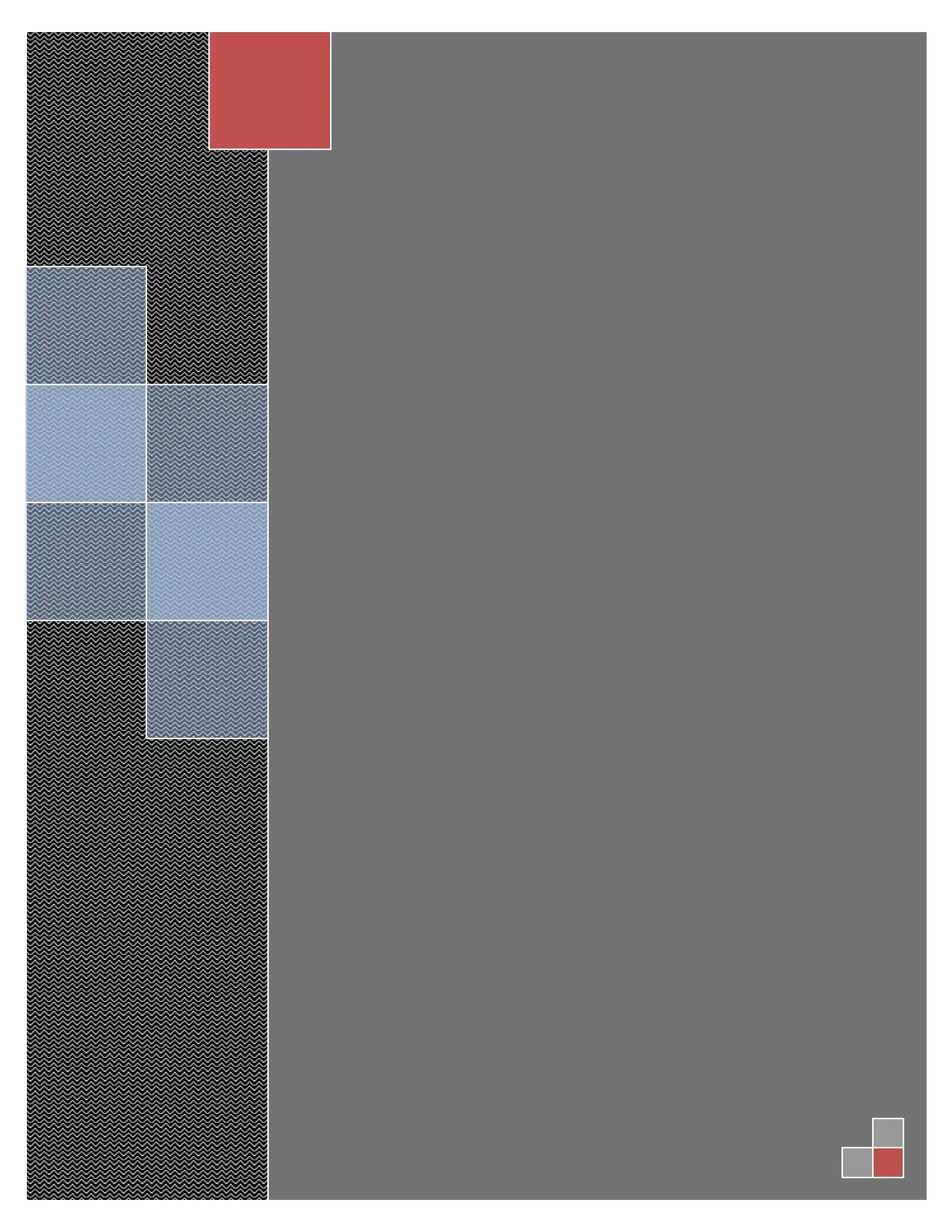
Paraphrase This Document
Need a fresh take? Get an instant paraphrase of this document with our AI Paraphraser
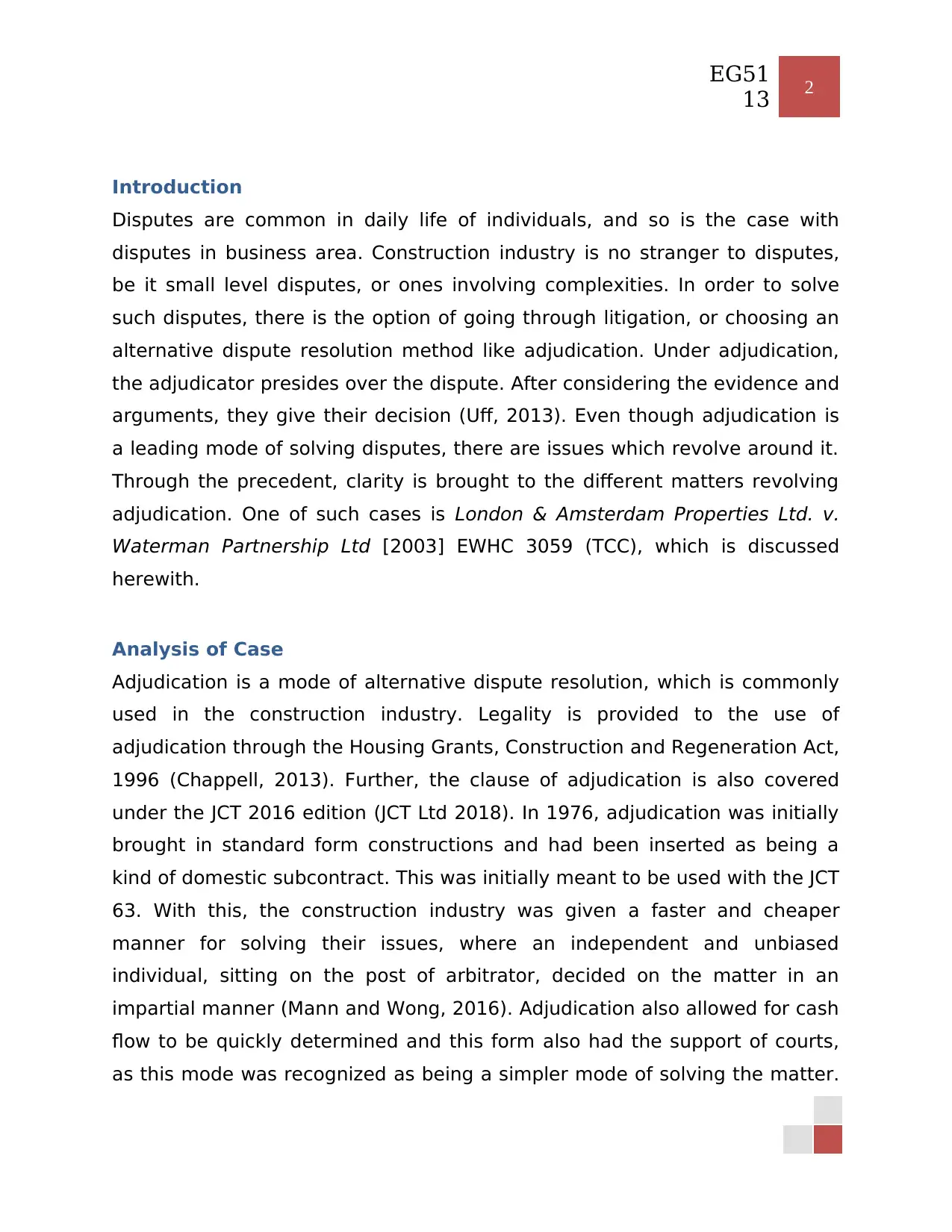
EG51
13 2
Introduction
Disputes are common in daily life of individuals, and so is the case with
disputes in business area. Construction industry is no stranger to disputes,
be it small level disputes, or ones involving complexities. In order to solve
such disputes, there is the option of going through litigation, or choosing an
alternative dispute resolution method like adjudication. Under adjudication,
the adjudicator presides over the dispute. After considering the evidence and
arguments, they give their decision (Uff, 2013). Even though adjudication is
a leading mode of solving disputes, there are issues which revolve around it.
Through the precedent, clarity is brought to the different matters revolving
adjudication. One of such cases is London & Amsterdam Properties Ltd. v.
Waterman Partnership Ltd [2003] EWHC 3059 (TCC), which is discussed
herewith.
Analysis of Case
Adjudication is a mode of alternative dispute resolution, which is commonly
used in the construction industry. Legality is provided to the use of
adjudication through the Housing Grants, Construction and Regeneration Act,
1996 (Chappell, 2013). Further, the clause of adjudication is also covered
under the JCT 2016 edition (JCT Ltd 2018). In 1976, adjudication was initially
brought in standard form constructions and had been inserted as being a
kind of domestic subcontract. This was initially meant to be used with the JCT
63. With this, the construction industry was given a faster and cheaper
manner for solving their issues, where an independent and unbiased
individual, sitting on the post of arbitrator, decided on the matter in an
impartial manner (Mann and Wong, 2016). Adjudication also allowed for cash
flow to be quickly determined and this form also had the support of courts,
as this mode was recognized as being a simpler mode of solving the matter.
13 2
Introduction
Disputes are common in daily life of individuals, and so is the case with
disputes in business area. Construction industry is no stranger to disputes,
be it small level disputes, or ones involving complexities. In order to solve
such disputes, there is the option of going through litigation, or choosing an
alternative dispute resolution method like adjudication. Under adjudication,
the adjudicator presides over the dispute. After considering the evidence and
arguments, they give their decision (Uff, 2013). Even though adjudication is
a leading mode of solving disputes, there are issues which revolve around it.
Through the precedent, clarity is brought to the different matters revolving
adjudication. One of such cases is London & Amsterdam Properties Ltd. v.
Waterman Partnership Ltd [2003] EWHC 3059 (TCC), which is discussed
herewith.
Analysis of Case
Adjudication is a mode of alternative dispute resolution, which is commonly
used in the construction industry. Legality is provided to the use of
adjudication through the Housing Grants, Construction and Regeneration Act,
1996 (Chappell, 2013). Further, the clause of adjudication is also covered
under the JCT 2016 edition (JCT Ltd 2018). In 1976, adjudication was initially
brought in standard form constructions and had been inserted as being a
kind of domestic subcontract. This was initially meant to be used with the JCT
63. With this, the construction industry was given a faster and cheaper
manner for solving their issues, where an independent and unbiased
individual, sitting on the post of arbitrator, decided on the matter in an
impartial manner (Mann and Wong, 2016). Adjudication also allowed for cash
flow to be quickly determined and this form also had the support of courts,
as this mode was recognized as being a simpler mode of solving the matter.
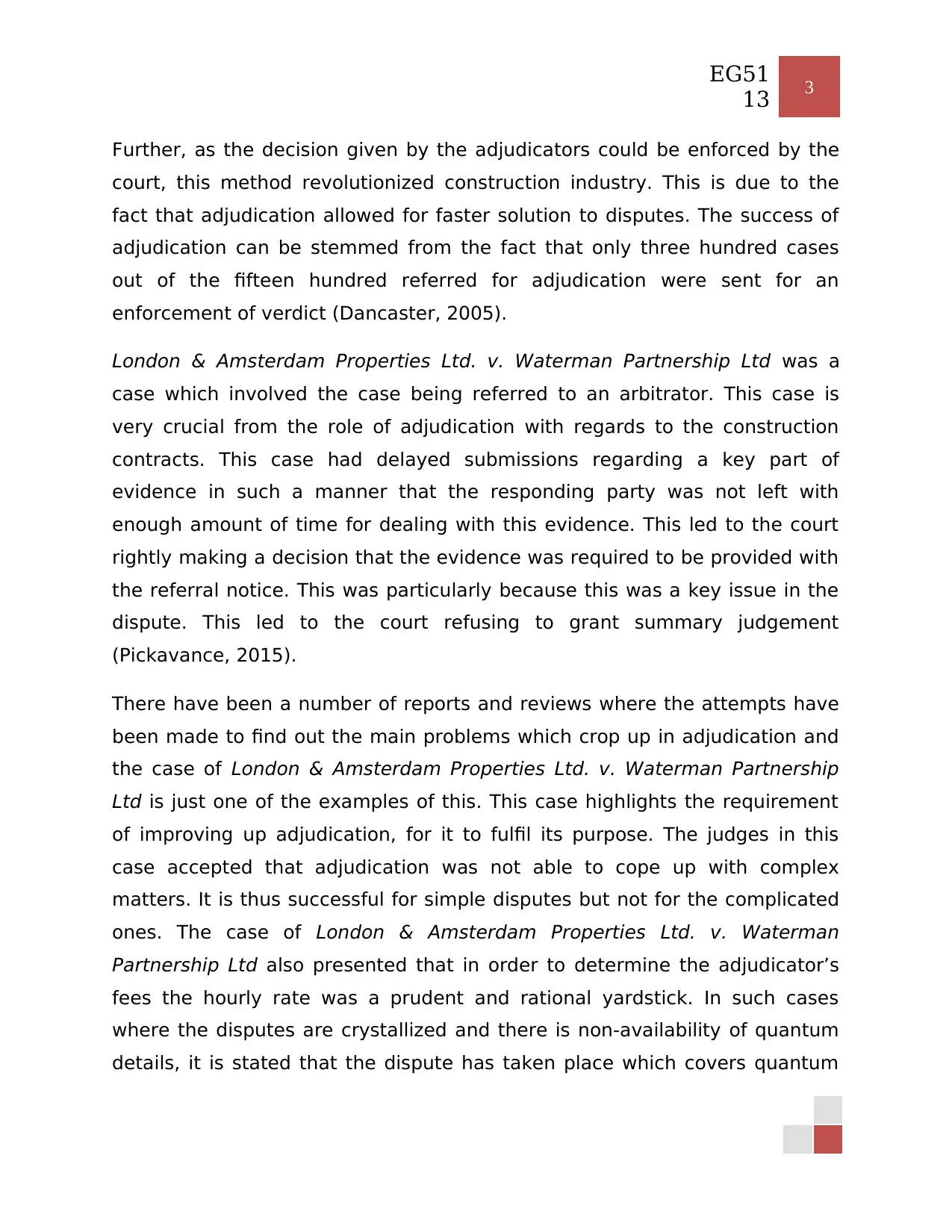
EG51
13 3
Further, as the decision given by the adjudicators could be enforced by the
court, this method revolutionized construction industry. This is due to the
fact that adjudication allowed for faster solution to disputes. The success of
adjudication can be stemmed from the fact that only three hundred cases
out of the fifteen hundred referred for adjudication were sent for an
enforcement of verdict (Dancaster, 2005).
London & Amsterdam Properties Ltd. v. Waterman Partnership Ltd was a
case which involved the case being referred to an arbitrator. This case is
very crucial from the role of adjudication with regards to the construction
contracts. This case had delayed submissions regarding a key part of
evidence in such a manner that the responding party was not left with
enough amount of time for dealing with this evidence. This led to the court
rightly making a decision that the evidence was required to be provided with
the referral notice. This was particularly because this was a key issue in the
dispute. This led to the court refusing to grant summary judgement
(Pickavance, 2015).
There have been a number of reports and reviews where the attempts have
been made to find out the main problems which crop up in adjudication and
the case of London & Amsterdam Properties Ltd. v. Waterman Partnership
Ltd is just one of the examples of this. This case highlights the requirement
of improving up adjudication, for it to fulfil its purpose. The judges in this
case accepted that adjudication was not able to cope up with complex
matters. It is thus successful for simple disputes but not for the complicated
ones. The case of London & Amsterdam Properties Ltd. v. Waterman
Partnership Ltd also presented that in order to determine the adjudicator’s
fees the hourly rate was a prudent and rational yardstick. In such cases
where the disputes are crystallized and there is non-availability of quantum
details, it is stated that the dispute has taken place which covers quantum
13 3
Further, as the decision given by the adjudicators could be enforced by the
court, this method revolutionized construction industry. This is due to the
fact that adjudication allowed for faster solution to disputes. The success of
adjudication can be stemmed from the fact that only three hundred cases
out of the fifteen hundred referred for adjudication were sent for an
enforcement of verdict (Dancaster, 2005).
London & Amsterdam Properties Ltd. v. Waterman Partnership Ltd was a
case which involved the case being referred to an arbitrator. This case is
very crucial from the role of adjudication with regards to the construction
contracts. This case had delayed submissions regarding a key part of
evidence in such a manner that the responding party was not left with
enough amount of time for dealing with this evidence. This led to the court
rightly making a decision that the evidence was required to be provided with
the referral notice. This was particularly because this was a key issue in the
dispute. This led to the court refusing to grant summary judgement
(Pickavance, 2015).
There have been a number of reports and reviews where the attempts have
been made to find out the main problems which crop up in adjudication and
the case of London & Amsterdam Properties Ltd. v. Waterman Partnership
Ltd is just one of the examples of this. This case highlights the requirement
of improving up adjudication, for it to fulfil its purpose. The judges in this
case accepted that adjudication was not able to cope up with complex
matters. It is thus successful for simple disputes but not for the complicated
ones. The case of London & Amsterdam Properties Ltd. v. Waterman
Partnership Ltd also presented that in order to determine the adjudicator’s
fees the hourly rate was a prudent and rational yardstick. In such cases
where the disputes are crystallized and there is non-availability of quantum
details, it is stated that the dispute has taken place which covers quantum
⊘ This is a preview!⊘
Do you want full access?
Subscribe today to unlock all pages.

Trusted by 1+ million students worldwide
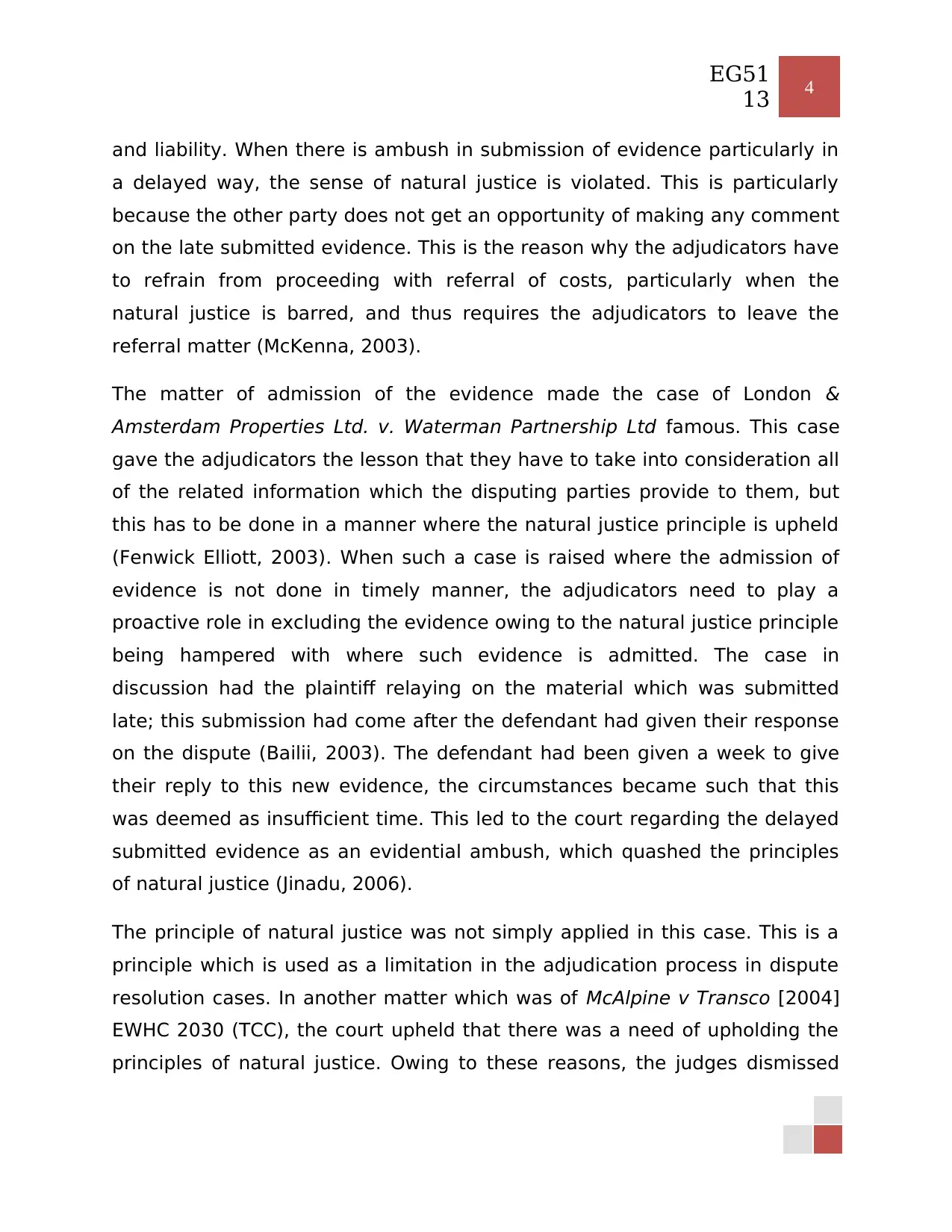
EG51
13 4
and liability. When there is ambush in submission of evidence particularly in
a delayed way, the sense of natural justice is violated. This is particularly
because the other party does not get an opportunity of making any comment
on the late submitted evidence. This is the reason why the adjudicators have
to refrain from proceeding with referral of costs, particularly when the
natural justice is barred, and thus requires the adjudicators to leave the
referral matter (McKenna, 2003).
The matter of admission of the evidence made the case of London &
Amsterdam Properties Ltd. v. Waterman Partnership Ltd famous. This case
gave the adjudicators the lesson that they have to take into consideration all
of the related information which the disputing parties provide to them, but
this has to be done in a manner where the natural justice principle is upheld
(Fenwick Elliott, 2003). When such a case is raised where the admission of
evidence is not done in timely manner, the adjudicators need to play a
proactive role in excluding the evidence owing to the natural justice principle
being hampered with where such evidence is admitted. The case in
discussion had the plaintiff relaying on the material which was submitted
late; this submission had come after the defendant had given their response
on the dispute (Bailii, 2003). The defendant had been given a week to give
their reply to this new evidence, the circumstances became such that this
was deemed as insufficient time. This led to the court regarding the delayed
submitted evidence as an evidential ambush, which quashed the principles
of natural justice (Jinadu, 2006).
The principle of natural justice was not simply applied in this case. This is a
principle which is used as a limitation in the adjudication process in dispute
resolution cases. In another matter which was of McAlpine v Transco [2004]
EWHC 2030 (TCC), the court upheld that there was a need of upholding the
principles of natural justice. Owing to these reasons, the judges dismissed
13 4
and liability. When there is ambush in submission of evidence particularly in
a delayed way, the sense of natural justice is violated. This is particularly
because the other party does not get an opportunity of making any comment
on the late submitted evidence. This is the reason why the adjudicators have
to refrain from proceeding with referral of costs, particularly when the
natural justice is barred, and thus requires the adjudicators to leave the
referral matter (McKenna, 2003).
The matter of admission of the evidence made the case of London &
Amsterdam Properties Ltd. v. Waterman Partnership Ltd famous. This case
gave the adjudicators the lesson that they have to take into consideration all
of the related information which the disputing parties provide to them, but
this has to be done in a manner where the natural justice principle is upheld
(Fenwick Elliott, 2003). When such a case is raised where the admission of
evidence is not done in timely manner, the adjudicators need to play a
proactive role in excluding the evidence owing to the natural justice principle
being hampered with where such evidence is admitted. The case in
discussion had the plaintiff relaying on the material which was submitted
late; this submission had come after the defendant had given their response
on the dispute (Bailii, 2003). The defendant had been given a week to give
their reply to this new evidence, the circumstances became such that this
was deemed as insufficient time. This led to the court regarding the delayed
submitted evidence as an evidential ambush, which quashed the principles
of natural justice (Jinadu, 2006).
The principle of natural justice was not simply applied in this case. This is a
principle which is used as a limitation in the adjudication process in dispute
resolution cases. In another matter which was of McAlpine v Transco [2004]
EWHC 2030 (TCC), the court upheld that there was a need of upholding the
principles of natural justice. Owing to these reasons, the judges dismissed
Paraphrase This Document
Need a fresh take? Get an instant paraphrase of this document with our AI Paraphraser
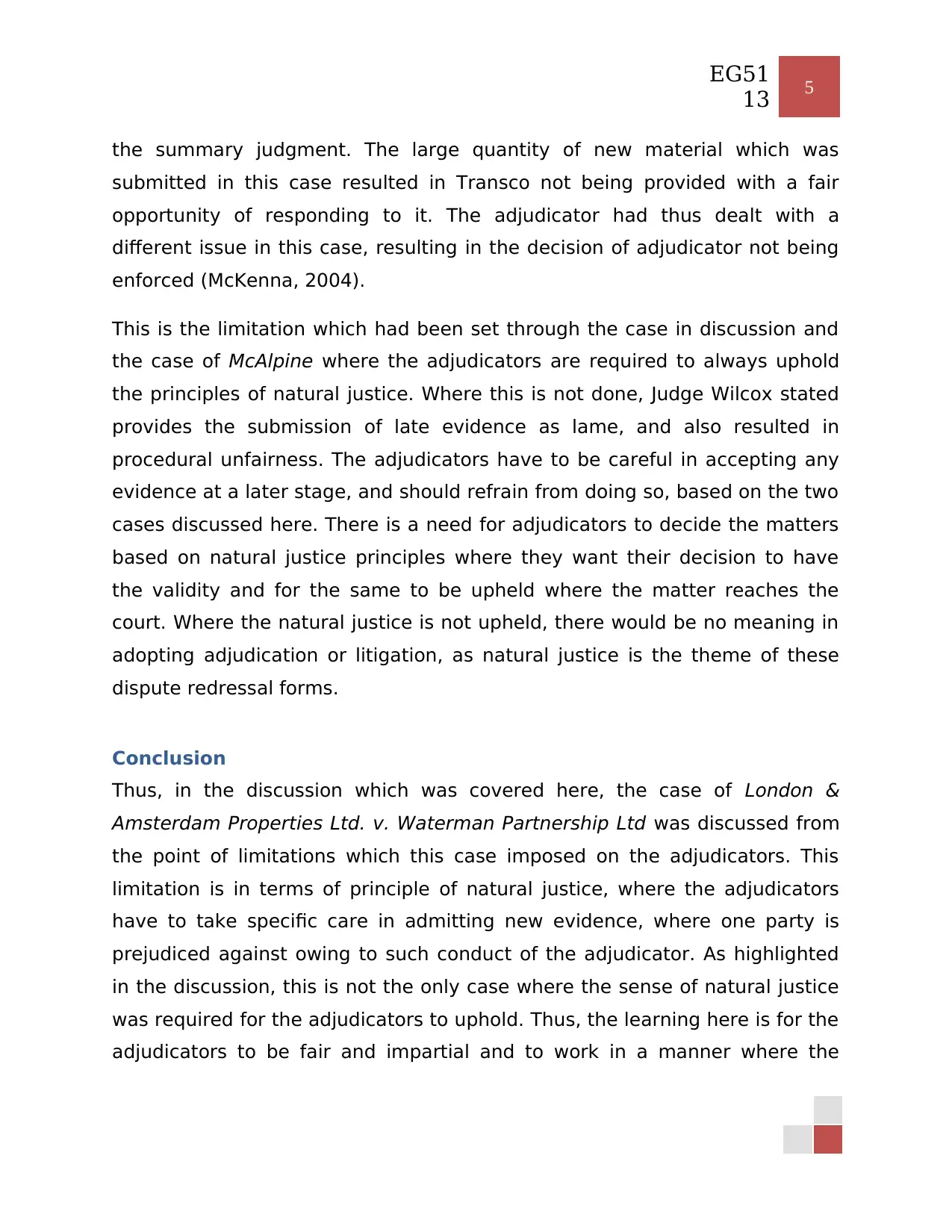
EG51
13 5
the summary judgment. The large quantity of new material which was
submitted in this case resulted in Transco not being provided with a fair
opportunity of responding to it. The adjudicator had thus dealt with a
different issue in this case, resulting in the decision of adjudicator not being
enforced (McKenna, 2004).
This is the limitation which had been set through the case in discussion and
the case of McAlpine where the adjudicators are required to always uphold
the principles of natural justice. Where this is not done, Judge Wilcox stated
provides the submission of late evidence as lame, and also resulted in
procedural unfairness. The adjudicators have to be careful in accepting any
evidence at a later stage, and should refrain from doing so, based on the two
cases discussed here. There is a need for adjudicators to decide the matters
based on natural justice principles where they want their decision to have
the validity and for the same to be upheld where the matter reaches the
court. Where the natural justice is not upheld, there would be no meaning in
adopting adjudication or litigation, as natural justice is the theme of these
dispute redressal forms.
Conclusion
Thus, in the discussion which was covered here, the case of London &
Amsterdam Properties Ltd. v. Waterman Partnership Ltd was discussed from
the point of limitations which this case imposed on the adjudicators. This
limitation is in terms of principle of natural justice, where the adjudicators
have to take specific care in admitting new evidence, where one party is
prejudiced against owing to such conduct of the adjudicator. As highlighted
in the discussion, this is not the only case where the sense of natural justice
was required for the adjudicators to uphold. Thus, the learning here is for the
adjudicators to be fair and impartial and to work in a manner where the
13 5
the summary judgment. The large quantity of new material which was
submitted in this case resulted in Transco not being provided with a fair
opportunity of responding to it. The adjudicator had thus dealt with a
different issue in this case, resulting in the decision of adjudicator not being
enforced (McKenna, 2004).
This is the limitation which had been set through the case in discussion and
the case of McAlpine where the adjudicators are required to always uphold
the principles of natural justice. Where this is not done, Judge Wilcox stated
provides the submission of late evidence as lame, and also resulted in
procedural unfairness. The adjudicators have to be careful in accepting any
evidence at a later stage, and should refrain from doing so, based on the two
cases discussed here. There is a need for adjudicators to decide the matters
based on natural justice principles where they want their decision to have
the validity and for the same to be upheld where the matter reaches the
court. Where the natural justice is not upheld, there would be no meaning in
adopting adjudication or litigation, as natural justice is the theme of these
dispute redressal forms.
Conclusion
Thus, in the discussion which was covered here, the case of London &
Amsterdam Properties Ltd. v. Waterman Partnership Ltd was discussed from
the point of limitations which this case imposed on the adjudicators. This
limitation is in terms of principle of natural justice, where the adjudicators
have to take specific care in admitting new evidence, where one party is
prejudiced against owing to such conduct of the adjudicator. As highlighted
in the discussion, this is not the only case where the sense of natural justice
was required for the adjudicators to uphold. Thus, the learning here is for the
adjudicators to be fair and impartial and to work in a manner where the

EG51
13 6
parties are given a fair chance of analysing the evidence. And where the
evidence is submitted late, they should avoid any sort of ambush in
submission of evidence.
13 6
parties are given a fair chance of analysing the evidence. And where the
evidence is submitted late, they should avoid any sort of ambush in
submission of evidence.
⊘ This is a preview!⊘
Do you want full access?
Subscribe today to unlock all pages.

Trusted by 1+ million students worldwide
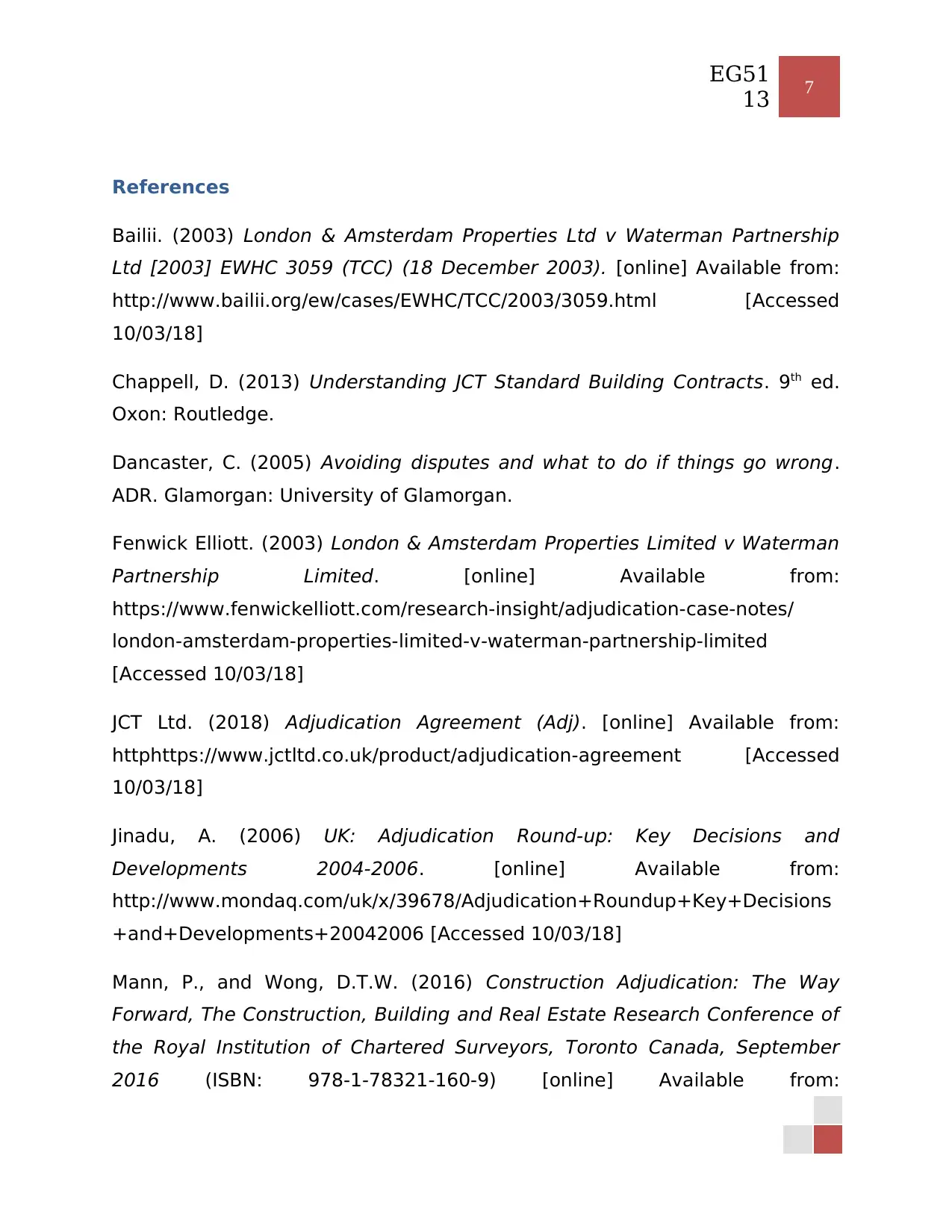
EG51
13 7
References
Bailii. (2003) London & Amsterdam Properties Ltd v Waterman Partnership
Ltd [2003] EWHC 3059 (TCC) (18 December 2003). [online] Available from:
http://www.bailii.org/ew/cases/EWHC/TCC/2003/3059.html [Accessed
10/03/18]
Chappell, D. (2013) Understanding JCT Standard Building Contracts. 9th ed.
Oxon: Routledge.
Dancaster, C. (2005) Avoiding disputes and what to do if things go wrong.
ADR. Glamorgan: University of Glamorgan.
Fenwick Elliott. (2003) London & Amsterdam Properties Limited v Waterman
Partnership Limited. [online] Available from:
https://www.fenwickelliott.com/research-insight/adjudication-case-notes/
london-amsterdam-properties-limited-v-waterman-partnership-limited
[Accessed 10/03/18]
JCT Ltd. (2018) Adjudication Agreement (Adj). [online] Available from:
httphttps://www.jctltd.co.uk/product/adjudication-agreement [Accessed
10/03/18]
Jinadu, A. (2006) UK: Adjudication Round-up: Key Decisions and
Developments 2004-2006. [online] Available from:
http://www.mondaq.com/uk/x/39678/Adjudication+Roundup+Key+Decisions
+and+Developments+20042006 [Accessed 10/03/18]
Mann, P., and Wong, D.T.W. (2016) Construction Adjudication: The Way
Forward, The Construction, Building and Real Estate Research Conference of
the Royal Institution of Chartered Surveyors, Toronto Canada, September
2016 (ISBN: 978-1-78321-160-9) [online] Available from:
13 7
References
Bailii. (2003) London & Amsterdam Properties Ltd v Waterman Partnership
Ltd [2003] EWHC 3059 (TCC) (18 December 2003). [online] Available from:
http://www.bailii.org/ew/cases/EWHC/TCC/2003/3059.html [Accessed
10/03/18]
Chappell, D. (2013) Understanding JCT Standard Building Contracts. 9th ed.
Oxon: Routledge.
Dancaster, C. (2005) Avoiding disputes and what to do if things go wrong.
ADR. Glamorgan: University of Glamorgan.
Fenwick Elliott. (2003) London & Amsterdam Properties Limited v Waterman
Partnership Limited. [online] Available from:
https://www.fenwickelliott.com/research-insight/adjudication-case-notes/
london-amsterdam-properties-limited-v-waterman-partnership-limited
[Accessed 10/03/18]
JCT Ltd. (2018) Adjudication Agreement (Adj). [online] Available from:
httphttps://www.jctltd.co.uk/product/adjudication-agreement [Accessed
10/03/18]
Jinadu, A. (2006) UK: Adjudication Round-up: Key Decisions and
Developments 2004-2006. [online] Available from:
http://www.mondaq.com/uk/x/39678/Adjudication+Roundup+Key+Decisions
+and+Developments+20042006 [Accessed 10/03/18]
Mann, P., and Wong, D.T.W. (2016) Construction Adjudication: The Way
Forward, The Construction, Building and Real Estate Research Conference of
the Royal Institution of Chartered Surveyors, Toronto Canada, September
2016 (ISBN: 978-1-78321-160-9) [online] Available from:
1 out of 7
Related Documents
Your All-in-One AI-Powered Toolkit for Academic Success.
+13062052269
info@desklib.com
Available 24*7 on WhatsApp / Email
![[object Object]](/_next/static/media/star-bottom.7253800d.svg)
Unlock your academic potential
Copyright © 2020–2025 A2Z Services. All Rights Reserved. Developed and managed by ZUCOL.


